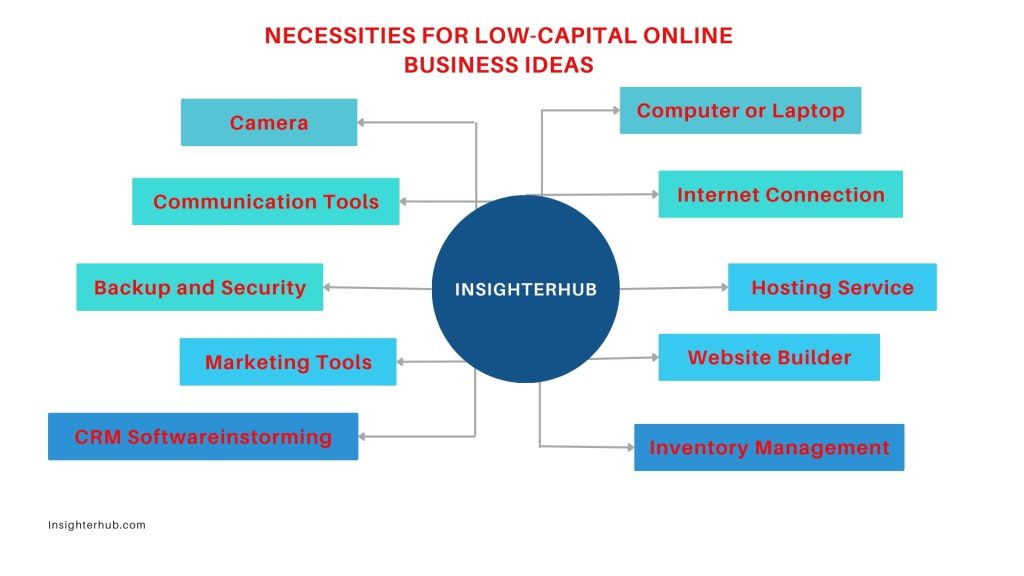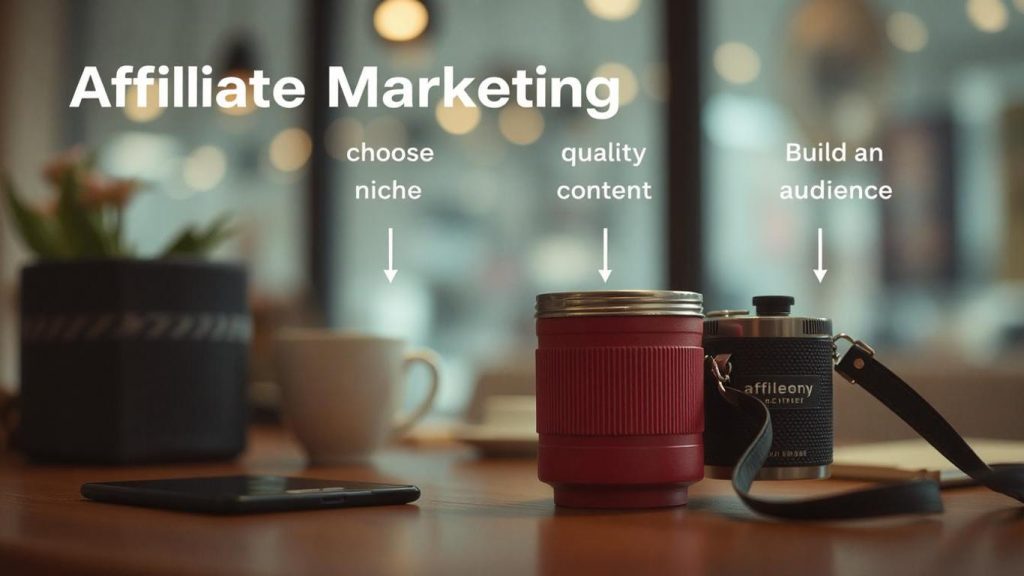After looking at the best businesses to start with 100k, it’s worth looking at low-capital online business ideas in Kenya.
Thoughts of the best businesses with low capital are common among people during tough economic times.
The low-capital online business ideas discussed in this article have the potential to earn fortunes with little or no investment capital.
Necessities for Low-Capital Online Business Ideas

Computer or Laptop
A good and efficient computer or laptop is arguably the most valuable asset for any online business.
It manages the website’s content, processes orders, provides customer support and manages the business’s overall operations.
It should offer a decent CPU, RAM, and storage capacity for multitasking, especially if you want to use it for demanding programs such as graphic design or video editing.
High-Speed Internet Connection
Stable and high-speed internet access is crucial for posting articles, handling transactions, and interacting with consumers and vendors.
It also impacts the rate at which online platforms associated with the business can be accessed and updated.
Make sure to get a broadband or fiber-optic internet connection for fast upload and download speeds so the business processes will not be slowed down.
Web Hosting Service and Domain Registration.
A website is like your store online; therefore, one must register domain names and web hosting to have the website go online.
A hosting service should provide a high uptime percentage, adequate security measures, and enough bandwidth for traffic.
Providers of these services include Bluehost, GoDaddy, and SiteGround, amongst others.
Related: List of the Best Web Hosting Companies in Kenya
E-commerce Platform and Website Builder
If you plan to sell your products online through your site, choose an e-commerce platform such as Shopify or WooCommerce.
These tools comprise features for handling products, accepting payments, and tracking lead generation.
Any other business that does not sell products online could use a basic website creation tool such as WordPress or Wix.
Payment Processing System
Therefore, payment processing is essential in accepting online payments and must be secure and dependable.
Payment gateways like PayPal, Stripe, and Square are pretty standard, and these can readily be interfaced with any e-commerce platform.
Ensure that the payment process is safe and convenient and that multiple forms of payment, such as credit cards, debit cards, and digital wallets, are allowed.
Inventory Management Software
If your company sells physical goods, inventory management software aids in item tracking, orders, and restocking.
This is important so that one does not end up ordering too much stock, thus incurring losses, or ordering too little and thus facing frequent stockouts.
These include TradeGecko, Zoho Inventory, and native features on platforms like Shopify.
Customer Relationship Management (CRM) Software programs
CRM helps you to be in charge of interactions with the customer and the potential customer.
This is because it helps monitor customer behavior, follow up on leads, and, most importantly, offer quality customer service.
Some commonly used CRMs are the Sales Force, Hub Spot, and Zoho CRM.
Marketing Tools
If your business is online, you will need marketing tools.
This could include email marketing software, social media management tools, SEO tools, and advertising platforms like Google Adwords and Facebook Adverts.
Depending on the size of your company, you can use Mailchimp for email marketing, powerful Hootsuite for social media, and SEMrush for SEO optimization.
Backup and Security Solutions
Data is a valuable asset in any online business; therefore, creating a backup plan and developing effective security measures is necessary.
Data backup is helpful to guard against the loss of information to prevent data loss, and antivirus software helps prevent possible threats from hackers.
Tools: Backup solutions like Google Drive or Dropbox and anti-virus programs like Norton, McAfee, or even Bitdefender.
Communication Tools
It is critical for any online business to immediately establish effective communication with its clients, suppliers, and employees.
Communication tools such as email clients, video conferencing, and collaboration tools are critical.
Examples: Email using Gmail or Outlook, video conferencing using Zoom, and team messaging using Slack or Microsoft Teams.
Camera
To produce high-quality videos for YouTube, it is necessary to have a good camera.
Based on the content you deliver, you could require at least different types of cameras, including DSLR, mirrorless, and high-end webcams.
Ensure the camera has a minimum of 1080p Full HD recording functionality. For improved quality, consider one with support for 4k resolution.
Frame Rate: A camera’s production quality includes the capability of shooting at least 30 fps, while 60 fps or higher is desired for smooth motion, especially for action-related videos.
Autofocus: The autofocus speed should also be fast and accurate mainly because if you are walking around with the camera or using it to capture products to sell, it would be pretty embarrassing to take a shot only to have the focus change in the middle of it.
Audio Quality: Most cameras are equipped with microphones, but the sound quality from those microphones is not professional. Check that the camera has a mic input so a separate microphone can be attached.
Portability: If you are going to vlog or record videos on the road, the size, weight, and battery capacity of the camera are essential. Popular Choices:
Popular Choices
DSLR Cameras: Canon EOS Rebel T7i, Nikon D5600
Mirrorless Cameras: Sony Alpha a6400, Canon EOS M50 Mark II
Webcams: Brio 4K Pro, c920 HD Pro webcam
Below are some Low-Capital Online Business Ideas
Content Creation
Monetizing content is one of the Low-capital online businesses in Kenya due to the simple requirements.
Creators need creativity, a platform (such as YouTube, Instagram, or a blog), and an internet connection.
The first step is to choose a niche they are interested in and have some mastery of anything from playing games to dressing up to working out.
Afterward, bloggers begin the process of making and posting content frequently so that they can get an audience.
Get to know who their audience is, ask for their opinion, and use it to improve their content.
Once you’ve built a sizable following, you can monetize your content through various avenues:
Once you’ve built a sizable following, you can monetize your content.
Content Creation Monetization Strategies
Sell Merchandise: Make merchandise like t-shirts, mugs, or stickers with your logo or slogans and sell to your audience.
Affiliate Marketing: Collaborating with companies and promoting their products or services through affiliate links, which earns a commission for each sale or referral.
Brand Sponsorships: Join brands related to your niche and post their products or services in your content for your benefit if you promote them.
Sponsored Posts: Make deals with brands to create sponsored content and show their products or services in your posts or videos for a fee.
TikTok Creativity Program: If you are on TikTok, then join their Creativity Program, which gives financial rewards to the creators for making lovable and engaging content.
Start a Patreon: The platform offers subscribers who pay a monthly fee for exclusive content, behind-the-scenes access, or special perks.
By producing excellent content and employing monetization techniques, bloggers can gradually establish a profitable business around their love for content creation with low capital investment.
Podcast Business

Starting a podcast business with low capital is feasible because it primarily depends on your content and networking abilities rather than financial resources.
First, bloggers should create relevant and engaging content for their target audience.
Podcasters may use free recording software and their current equipment, such as a laptop and microphone.
Afterward, they use their network to interview influencers or demonstrate their knowledge through examples.
Podcast Monetisation Strategies
Podcast subscriptions: Podcasters allow subscribers to access unique content others cannot see.
Donations: Podcasters give listeners ideas on how to help them with their podcasts through Patreon.
Sponsorships: Partner with local or big-time sponsors to do shoutouts and advertisements.
Affiliate marketing: Post products their audience is interested in, and, at the same time, can get commissions on the sales.
E-commerce: It is possible to sell merchandise, courses, or eBooks related to their podcast’s niche, which will be lucrative.
Consulting Business

Starting a freelance consultation with a low-capital Online Business Idea is possible because consultants can use the skills and resources available.
To begin with, consultants must discover their marketable skills or expertise in writing, programming, design, or any other service they can offer remotely.
Besides that, they can use free online platforms and social media platforms to display their qualities and contact possible clients.
As they obtain and deal with more clients, consultants should use their earnings to build a professional website to boost their reputation and attract more clients.
Consultant, Business Monetisation Strategies
Provide free introductory services or consultations to the first clients to attain trust and break into the market.
Current tiered pricing options, including extra services and features in premium packages.
Use freelance marketplaces like Upwork, Fiverr, or Freelancer to get clients and earn projects.
Affiliate marketing by advertising products or services with your expertise and getting referral commissions.
Create digital products like e-books, courses, or templates that fit into your services and sell them through your website or online platforms.
Partner with businesses or agencies different from yours or outside your industry through partnerships or subcontracting opportunities to increase your customer base and services.
Propose ongoing services and subscriptions for clients who need regular support or maintenance.
Blogging

The question of whether Blogging is a good business is common among many people interested in low-investment businesses.
Blogging, one of the most profitable businesses to start with less than 100, is a very low-cost investment.
Bloggers will need a computer and an internet connection, which are resources that are probably already available to them.
Depending on the hosting features, consider paying hosting fees ranging from $20 to $100 per year.
Next, they will create an essential website using WordPress, which has a lot of ready-made blogging tools.
Once their website is fully functional, they should focus on producing high-quality content that appeals to their target audience and can grow and expand a devoted fan base.
Related: 10 Best AI Tools for Bloggers in 2024
Blogging Monetisation Strategies
E-commerce: Bloggers sell their products or services, such as physical products, digital downloads, or online courses, from their websites.
Affiliate marketing: Using the company’s link, you work with companies and promote their products or services on their websites. You earn a commission for every sale or referral.
Advertising: Using networks, such as Google AdSense or a direct contract with advertisers to put ads on their site and receive revenue according to the number of impressions or clicks.
Donations: Another way bloggers can monetize their content is through voluntary payments or memberships using sites like Patreon or PayPal.
Memberships: Bloggers can offer free access to premium content or community features in return for a subscription fee; thus, they will get the most loyal fans to pay for it.
Sponsorships: Bloggers can team up with brands in their niche and get paid to promote created content or events.
Affiliate Marketing
Through Affiliate marketing, bloggers can leverage social media platforms or blogs to sell out other people’s products for a commission as compensation.
In doing so, they register for affiliate programs from different companies, which supply them with unique links or codes to monitor the traffic and sales they generate.
Bloggers get a commission through their affiliate link when someone buys or acquires something in line with their suggestions.
This strategy requires a platform to advertise products, such as blogs or social media accounts.
Affiliate Marketing Process

Choose a Niche: Marketers choose an area that matches their potential users’ hobbies, skills, and tastes.
Create Quality Content: They then design quality content to teach and solve the problems of their audience through blog posts, videos, social media posts, or email newsletters.
Build an Audience: Bloggers can increase their audience using natural methods such as search engine optimization (SEO), social media engagement, and email marketing.
Join Affiliate Programs: Marketers then join affiliate programs that match their niche and attract users interested in their products, such as Amazon, ClickBank, and ShareASale.
Promote Affiliate Products: Combine affiliate links with their content to look integrated and not forced.
Track and Optimize: Track the performance of their affiliate links and campaigns using analytics tools from affiliate networks or third-party software.
Diversify Income Streams: Look into various monetization strategies such as sponsored content, digital product sales, etc.
Having multiple sources of income can help bloggers guarantee their earnings even if one of the sources is risky.
Affiliate marketing is a low-capital online business idea that allows marketers to start an online business with little investment quickly.
It is widely accessible to anyone with an internet connection and a passion for a particular topic or niche.
Other Low-capital Online Business Ideas in Kenya
Online Community Management
Coaching
Reasons to Invest in Low-Capital Online Businesses
Minimal Investment Requirements: Most online business ideas can be started with little or no capital at all, and thus, they can be started by anyone.
Flexibility: These businesses can be started part-time while the entrepreneur is still holding another job, and thus, they have growth potential.
Earning Potential: Courses, coaching, and freelancing are all very profitable regardless of how much money you invest initially.
Scalability: Persons performing freelance services such as content creation or writing blogs can develop their businesses to accommodate many customers and make money.
Diverse Monetization Options: Sponsorship, affiliate marketing, selling digital products with number revenue streams is possible to have financial stability.
Global Reach: Online businesses have greater access to other countries and therefore can have a more extensive network and sales arena.
Work-from-Home Convenience: These businesses can be operated from home and thus there is less pressure on business owners to rent physical offices.
Automation: Some activities, such as replenishment, customer relations, and transactions, can readily be automated, which can also cut down on time.
Tips when Starting a Low-capital Online Business
When implementing a low-capital business idea, you must be wise with your expenses.
For instance, having a website might be expensive, but it will ultimately make your business look more professional and trustworthy.
Consider maintaining your present job as you start your low-capital business as a side hustle, as the business may take a long time to be sustainable.














